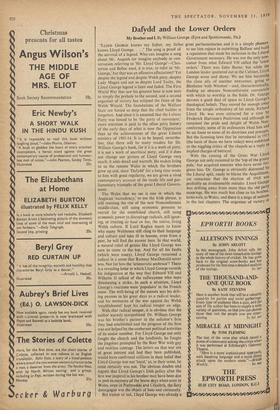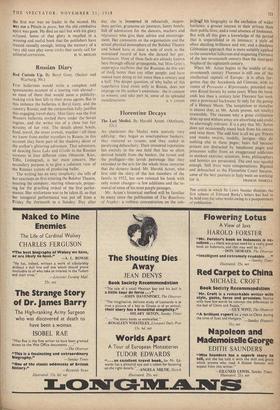Dafydd and the Lower Orders
My Brother and I. By William George. (Eyre and Spottiswoode, 30s.) knows Lloyd George. . . .' The song is proof of to see him rejoice in outwitting Balfour and build the survival of a legend. Who can imagine a song a reputation that made his inclusion in the Liberal
about Mr. Asquith (or imagine anybody in con- Government necessary. He was not the only new-
versation referring to 'Mr. Lloyd George'—Ches- corner from what Edward VII called the lower terton and Belloc used, it is true, to refer to `Mr. orders.' There was John Burns; but while the George,' but that was an offensive affectation)? Yet London leader sputtered out in the Cabinet, Lloyd despite the legend and despite Welsh piety, despite Lady Megan and not so despite Lord Tenby, the Lloyd George legend is faint and faded. The First World War that saw his greatest hour is now seen as simply the prelude to the second, and a second organiser of victory has eclipsed the fame of the Welsh Wizard. The foundations of the Welfare State are buried so deep that the chief builder is forgotten. And since it is assumed that the Labour
Party was bound to be 'the party of movement,' more attention is paid to the often petty history of the early days of what is now the Opposition
than to the achievements of the great Liberal ministry of 1905-14. It is to be hoped, neverthe- less, that there will be many readers for Dr. William George's book, for if it is a work of piety, it is not a work of uncritical piety; and if it does not change our picture of Lloyd George very much, it adds detail and warmth. He makes living to us the remote Wales in which the brothers grew up and, since `Dafydd' for a long time wrote to him with great regularity, we are given a vivid contemporary account of the inside life and par- liamentary triumphs of the great Liberal Govern- ment.
The Wales that we see is one in which the Anglican 'ascendency,' to use the Irish phrase, is still resisting the rise of the new Nonconformist middle-class, still using economic pressure to recruit for the established church, still using economic power to discourage radicals, still ignor- ing, or treating de haut en bas, the native, living Welsh culture. If Lord Raglan wants to know why many Welshmen still cling to their language and culture and take ill to lessons, even from a peer, he will find the answer here. In that world, a natural rebel of genius like Lloyd George was sure to come to the top. And for all his faults (which were many), Lloyd George remained a radical in a sense that Ramsay MacDonald never was. Not for him the 'aristocratic embrace' ! There is a revealing letter in which Lloyd George records his indignation at the way that Edward VII and Wilhelm II talked of the railwaymen who were threatening a strike.- In such a situation, Lloyd George's reactions were `populaire' in the French sense. The well-being of the masses was his driv- ing passion in his great days as a radical leader, and his memories of the war against the Welsh `establishment' kept his radical temper on edge.
With -that radical temper, it is obvious that the author warmly sympathised. Dr. William George was his brother's partner in the solicitor's firm they had established and the progress of the firm was not helped by the exuberant political activities of its senior member. For Lloyd George not only fought the church and the landlords, he fought the jingoism prompted by the Boer War with gay and reckless courage. The letters on that war are of great interest and had they been published, would have confirmed millions in their belief that Lloyd George was not 'loyal,' as, in their sense, he most certainly was not. The obvious doubts and regrets that Lloyd George's Irish policy after the first war inspired in his brother may have been due in part to memory of the brave days when even in Wales, even in Porimadoc and Criccietb, the fiery demagogue was the object of hate and contumely.
But traitor or not, Lloyd George was already a 'LLOYD GEORGE knows my father, my father great parliamentarian and it is a simple pleasure
George arose and shone. We see him becoming the close ally of another newcomer, going to Blenheim 'with Winston'—and, characteristically, finding an obscure Nonconformist conventicle with which to worship in the fields. Dr. George devotes a good deal of space to Lloyd George's theological beliefs. They moved far enough away from the simple orthodoxy of his uncle, Richard Lloyd. He was even attracted for a time by Frederick Harrison's Positivism and although he remained the pride and delight of Welsh Non- conformity, some of its ordinances irked him and he sat loose to some of its doctrines and precepts. But the licensing laws that he introduced in 1915 (the basis of those we have today) were exhibited to the niggling critics of the chapels as a reply to implied charges of betrayal. With the coming of the Great War Lloyd George not only mounted to the 'top of the greasY pole,' but acquired enemies who have never for- given him. Dr. George is obviously distressed by the Liberal split, ready to blame the Asquithians, yet conscious that the election of 1918 Was probably an irredeemable mistake. Lloyd George was drifting away from more than the old party moorings. He was much less close to his brother, to his wife, to Wales; and there is a tinge of sadness in the last chapters. The organiser of victorY in the first war was no leader in the second. He was not a Pdtain in posse, but the old combative spirit was gone. He died an earl but with his glory eclipsed. Some of that glory is recalled in a winning and useful book that the publishers have treated casually enough, letting the memory of a very old man play some tricks that surely call for















































































 Previous page
Previous page